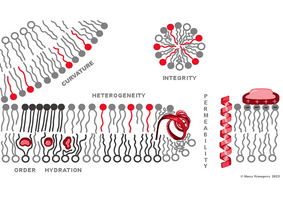It was with great dismay and sadness that we, the board members of the German Society for Biophysics, received the news of the completely unexpected and all too early death of our highly esteemed member and former executive secretary of the DGfB, Prof Dr Ulrike Alexiev. In Ulrike, the DGfB, as well as the entire German Biophysics community, has lost a very successful, committed and internationally visible scientist who was a role model for many young scientists, especially female scientists.
Ulrike began her scientific career after completing her diploma studies (1983-1988) at the Humboldt University of Berlin and working at the Max Delbrück Centre in Berlin-Buch as a doctoral student in the Department of Physics at the Freie Universität Berlin, where she obtained her doctorate in biophysics with distinction under Prof. Maarten P. Heyn in 1994. After research stays in the USA, Ulrike habilitated at the Department of Physics at Freie Universität in 2002 and founded her own research group there.
She taught biophysics and general physics with great commitment and pedagogical skill. She used her high level of expertise in the field of time-resolved fluorescence spectroscopy and imaging techniques very successfully in molecular biophysics to elucidate the functional mechanisms of biological photoreceptors such as bacteriorhodopsin, rhodopsin, channelrhodopsin and phytochromes. In biomedicine, she has investigated cytochrome c oxidase and, more recently, the transport of substances through the skin and the properties of hydrogels. Ulrike's outstanding research achievements have been documented in numerous internationally recognised publications and will not be forgotten.
As a member of the DGfB board, Ulrike also became involved in German biophysics and young scientists very early on. From 2007 to 2014, she very actively managed the DGfB's business as secretary, providing intensive support to three chairmen (Peter Hofmann, Ulrich Nienhaus, Hans-Joachim Galla). Some of the innovations that have sustainably promoted the development of our society with her initiative were, for example, the creation of the German "Biophysics" location map with brief descriptions of the working groups. Writing and sending out DGfB newsletters in electronic form also began during her time as Executive Secretary; in particular, Ulrike has driven forward the professional modernisation of our society's homepage, thereby significantly increasing the visibility of our society.
Nationally, Ulrike Alexiev has been very successful and creative in organising the DGfB's section meetings and annual conferences, and she has also been involved internationally in organising the European EBSA conferences. She was particularly keen to promote young scientists, for example through travel grants to the meetings of biophysical societies. Through her committed behaviour and advocacy of equality, she was always a role model for colleagues and the next generation of scientists. During her eight years on the Board, Ulrike played a key role in shaping the profile of the DGfB. Through her constructive work, her pleasant and friendly manner and her assertiveness, she always played a balancing role between different interest groups on the DGfB Board.
Our sincere condolences go to the members of her family, friends, colleagues and all those who were close to Ulrike. The German Society for Biophysics will honour her memory and keep her commitment and personality in grateful remembrance.
On behalf of the Board of the DGfB
Prof Dr Klaus Gerwert











